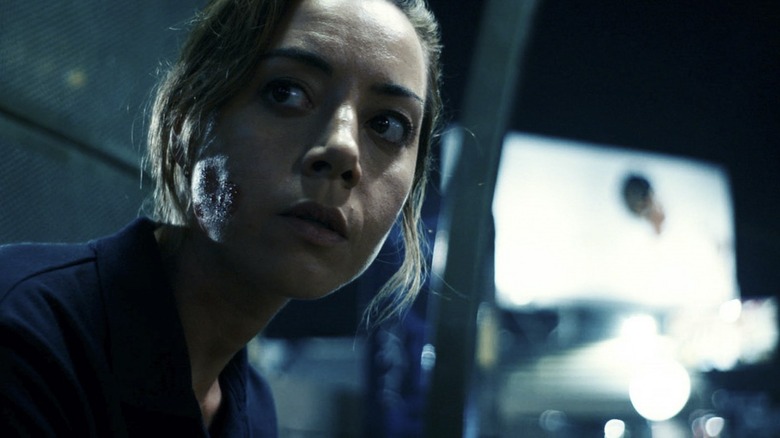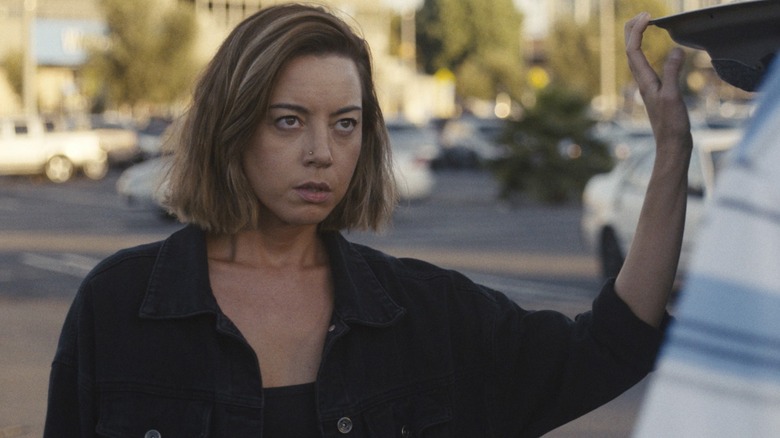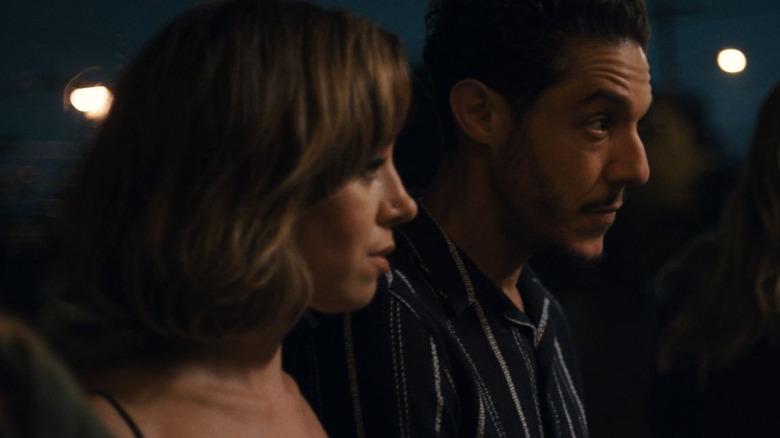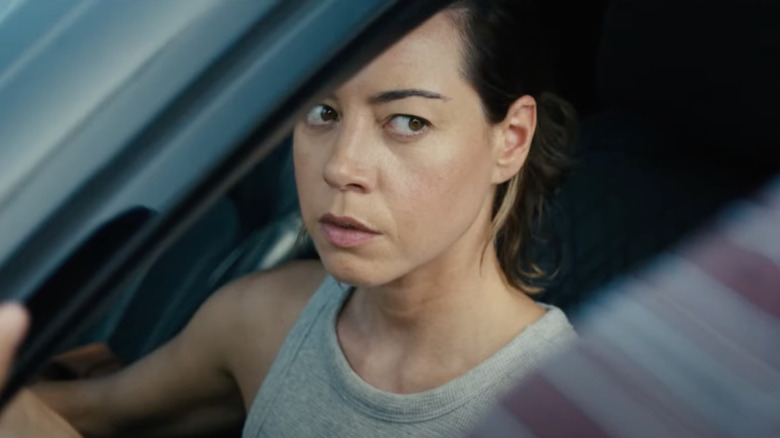Emily The Criminal Director John Patton Ford On Making A Throwback Crime Film [Interview]
"Emily the Criminal" isn't about a glamorous life of crime. It's not about the rocking highs, the one last job, or the score to end all scores. It's a crime story about survival, with its characters just trying to make it through another crummy week. As Chris Evangelista wrote in his review, "Coupled with the prevailing sense of economic hopelessness, 'Emily the Criminal' often feels like a crime saga for the gig economy; a 'Scarface' for people who work at DoorDash, with capitalism as the film's Big Bad."
John Patton Ford is the writer and director behind the throwback crime film, which focuses more on the mundane than the highly stylized. There's no artifice — just Emily (Aubrey Plaza) working and hustling. It's a character-driven film with Plaza making every moment feel believable and vital. It's a great performance When we caught up with Ford recently to discuss the movie, we talked about that great performance, and how he realized it was so strong, in fact, that he had to cut out scenes that didn't have her in them.
'I haven't seen the whole spectrum of what she has yet'
Of course, you had a voice for Emily on the page, but how did that voice change or evolve with Aubrey's performance?
Aubrey is very ... she is aggressive and determined, and when she wants something, she just goes for it in such a fearless and focused way. I think when she came on board, the character became even more narrowly focused and more driven. I leaned into that. She has so much of that naturally, that kind of seeped into the character a bit more when she came on board for certain, if that makes any sense.
It just naturally happened. I feel like we talked a lot about the character's backstory and what her relationship was like with the other people in the movie. But in terms of just what she's like, just walking around, I feel like that just happened. There's a lot of Aubrey in that, a lot of her doggedly determined nature. There's a lot of her.
What made you decide to make her from Jersey?
I think that the perennial East Coast character who's stuck in L.A. is a classic, iconic character. Especially when you move here, there's just so many people from the New York area. And either you acclimatize to what it's like living here, or you don't, and you're constantly this fish out of water. I know so many people from New Jersey. And in a way, I feel like I should be from New Jersey.
My parents were living in Manhattan in the '70s and then they moved somewhere else to have kids. And usually people moved to Long Island or Jersey, but my parents moved to South Carolina. So I'm from South Carolina, but in a weird way, I almost feel like I should have been from one of those places around the city. I feel a kinship with people who are from there.
Of the '70s crime movies "Emily the Criminal" calls to mind, you really capture the mundanity a part of them, just trying to get through the day. Was that important to you?
Yeah. So many of my favorite movies are from that era, especially a lot of Sidney Lumet movies, like "Dog Day Afternoon," or [William Friedkin's] "The French Connection." Those are the big obvious ones. So many of those movies are not afraid to test the audience and to stretch the audience and to ask the audience to empathize with the sort of person that they typically would not be asked to empathize with. In a lot of ways, those movies just had a lot more faith in the audience. This is before there were algorithms telling studio execs what to invest in. It was just individuals going, "Let's take a gamble on this." So yeah. It's a big throwback.
I thought of "Straight Time" because of the casting. In that movie, Dustin Hoffman is terrifying, and at the time, I don't think people thought of him in that light. Aubrey, she's great and has range, but was showing her in a different light appealing?
Yeah. I love so many of those movies that cast someone who you think you know, and then suddenly you see them in a totally different light. I mean, there's a joy to that. That just stands apart from the movie itself. Just that experience alone is pretty fun. I think of seeing Mickey Rourke in "The Wrestler," it was so fascinating. I was like, "Here's this guy I haven't thought of in so long, and now like he's doing this." Or Sandler in "Punch Drunk Love" is the example that we always bring up.
So yeah, meeting Aubrey and suddenly being like, "Oh, look at this complicated, colorful person. I haven't seen the whole spectrum of what she has yet. I didn't know that she had all this going on. Wouldn't it be cool to show that to an audience and to pull back the curtain on this person who we think we know?"
So every day was a nice surprise?
Every day. Every day. With her, it's never predictable. She has this profound ability to catch you off guard at all times with all things. You never quite know what you're going to get. She's, and I mean this in the most loving way, a really unsafe person. She's so unpredictable. And so every day was just a huge surprise. It's a cop-out answer, but that's really the truth.
'Usually, crime movies are about someone who loves being a criminal'
How many shooting days did you have?
I mean, we shot the movie in no time, man. We shot the whole thing in 20 days or 21 days. But believe it or not, we did shoot a lot of takes and that's because of the way that we shot it. We did it in a way that's loose enough where we were able to maximize our time. We would just shoot and shoot and shoot. Very often, we'd start the scene the way it was written, and then we'd start improvising. And then by the time we've done nine or 10 takes, it's still the same scene, but it's just way looser and way more improvised than it started off.
What about Los Angeles was important for you to capture over those 21 days?
I'd say the diversity of Los Angeles. It's something I'd never see in movies. Usually, movies about L.A. are isolated to certain ethnic worlds. We're either in east L.A. in Boyle Heights with Mexican gangsters or something, or we're in South Central or we're just with all white people in Santa Monica. And none of those things are accurate.
I mean, the movie is diverse in every single corner. You have a cross section of people in every corner. There's something like a 60% non-Anglo population. 40% of the people here, their parents are first generation. So it's just diverse in a way that's hard to compare to really anywhere in the world. I wanted to show that. I wanted my experience of the diversity of L.A. to be felt in the movie.
You first experienced the world of credit card fraud in L.A., right?
Yeah. I lived in this neighborhood 10 years ago and I knew there was some kind of crime going on. I knew there was some organized crime in the neighborhood, but I didn't know what was up. And then just one day, cover of The L.A. Times, it was this massive FBI bust. And I realized, "Oh, these are literally the dudes on my block." I read about what they'd been up to. A lot of it was unexciting. A lot of it was drugs and guns and stuff I didn't care about. But then they did this elaborate credit card fraud that I couldn't believe. It was so strange and so unique. That's how I got interested.
There really aren't many guns or drugs in this movie.
There are actually no guns in this movie. The thing is, audiences have seen that stuff so many times, that when they see it, it's just so familiar. You just tune it out. Whereas if you see something you've never seen before, suddenly you have the suspense of the unfamiliar. I wanted to capitalize on that and really make it seem so granular and so singular that you feel like, "Oh, this must be real. This isn't something that I can just categorize and put into some box that I'm already familiar with. I have to pay attention, because this is the first time I'm seeing this." That's how I wanted it.
After all the research you did for this, how much do you now know about credit card fraud?
Enough to potentially put me on some watch list, I'm sure. I'm sure someone in the FBI's listening to me on my phone right now. No, I did a lot of research and spoke to people who shall remain nameless. So I feel like I have a pretty good handle on it at this point.
Not to talk out of school, but what did you learn from some of those people you talked to?
That none of them like doing it very much. That none of them did it for pleasure or enjoyment. They all had goals. They all had really specific things that they wanted to achieve. And this was just a means to an end. I think this is something integral: Usually, crime movies are about someone who loves being a criminal. I think those people are out there, but more often than not, it's just people who really want something and they can't figure out another way to get it. They end up doing this thing that's just available and accessible.
'I always knew that it was a coming of age story'
Did you always have this ending in mind for Emily?
Yeah, but it's tough to talk about without totally giving the movie away to people. I always knew that it was a coming-of-age story underneath it, and that it was about someone learning what they're good at and what they like to do and what they'll probably continue to do in the future. While you're watching the movie, you're watching a thriller and you're held in suspense, but when it's over, only then do you realize, "Oh, that was a coming-of-age story," about someone arriving at, perhaps, where they were always destined to go. And so, yeah. I always had that ending.
So you always saw it as a coming-of-age story?
No, I think the first draft, I was just writing a thriller. I was trying to figure out how to write something that I could make inexpensively and that had thrilling set pieces. It wasn't really personal in the beginning. As I continued to work on it, it became more personal and more emotional. It became more about the character.
Once Aubrey got involved, was it easy to get this made?
No, it was a lot of work. I mean, I met Aubrey four years ago when she got the script. At that point, I'd been writing the script for a couple years. And so, it took us a couple years from that point to find the money. The reality is that we live in a world where it doesn't make a ton of sense to make a movie like this that's this low budget. How do you do that? How do you sell it? How do you make money? How? The system is no longer set up to support stuff like this. So it really was a small miracle that it happened.
Correct me if I'm wrong: She's in every scene, right?
Yeah. There are actually some scenes that she's not in, but we cut them out.
When you cut the scenes that Emily wasn't in, did it just make the movie more intimate?
Yeah. And also, we just discovered that the minute you leave her, it felt like some sort of violation of a contract that had been created with the audience. Without her in the scene, it felt like, "Wait a minute, this isn't the movie that we were told we were watching." It felt just wrong. She has a certain magnetism and a certain charisma. You just want to watch her do things. You just never know what she's going to do in life and in this movie. If you got her, you might as well hold on her.
"Emily the Criminal" opens in theaters on August 12, 2022.



